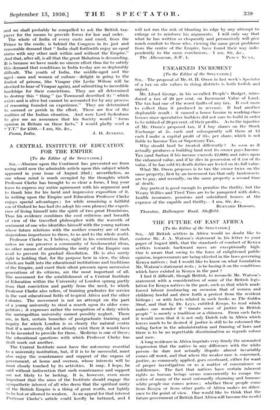A CENTRAL INSTITUTE OF EDUCATION FOR THE EMPIRE
[To the Editor of the Scat-rats:1u.] Sin,—Absence upon the Continent has prevented me from seeing until now the admirable article upon this subject which appeared in your issue of August 23rd ; nevertheless, as one whose mind is much occupied by the thoughts which Professor Clarke has brought to so clear a focus, I beg your leave to express my entire agreement with his argument and to thank him for his lucid and impressive exposition of it. In writing upon the Empire and Education Professor Clarke enjoys special advantages ; for while remaining a faithful son of Oxford he has had (to adopt his own phrase) the experi- ence of living himself into the spirit of two great Dominions. Thus his evidence combines the cool criticism and breadth of view of the travelled philosopher with the warmth of sentiment of one who identifies himself with the young nations whose future relations with the mother country are of such stupendous importance to them, to us and to the whole world.
l'rofessor Clarke is, I believe, right in his contention that, unless we can preserve a community of fundamental ideas, no other means of maintaining the unity of the Empire can avail to prevent its gradual dissolution. He is also surely right in holding that, for the purpose here in view, the ideas which are built into the educational institutions and traditions of the Empire, and exert their silent pressure upon successive generations of its citizens, are the most important of all. The movement for the establishment of a Central Institute of Education within the University of London sprang partly from that conviction and partly from the need, to which Professor Clarke also refers, of training graduates for service in the vast educational fields of tropical Africa and the other Colonies. The movement is not an attempt on the part of a young university to steal a march upon its older com- petitors; it expresses rather the recognition of a duty-which the metropolitan university cannot possibly neglect. There are, in fact, certain branches of postgraduate training and inquiry for which London is so clearly the natural centre that if a university did not already exist there it would have to be invented to provide for them. ,. Medicine is one of these ; the educational questions with which. Professor Clarke. has dealt mark out another.
The Central Institute must have the autonomy essential. to a university institution, but, if it is to be successful, must also enjoy the countenance and support of the organs of government, at home and oversea, whose interests will be most closely touched by its activities. It may, .I hope, be said without indiscretion that such countenance and support are not likely to be lacking. It is, however, even more important that the aims of the Institute should engage the sympathetic interest of all who deem that the spiritual unity of the British Empire is a thing of great worth, not lightly to be lost or allowed to weaken. As an appeal for that interest Professor Clarke's- article could hardly be bettered, and I
will not run the risk of blunting its edge by any attempt to enlarge or to reinforce his arguments. I will only say that what he has written so eloquently and persuasively will give much comfort to those who, viewing the same great problems from the centre of the Empire, have found their way inde- pendently to the same conclusions.—I am, Sir, &c.,










































 Previous page
Previous page